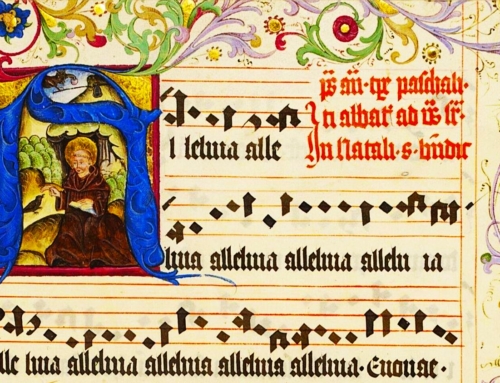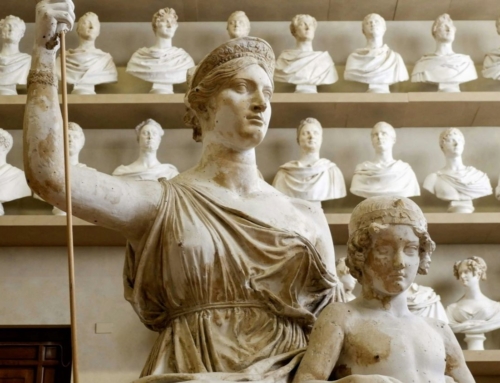In those days a great number who believed turned to the Lord. . .
This line from today’s first reading puzzled me. Here, St. Luke writes as if there is a distinction between those “who believe” and those who are “turned to the Lord.” Subtly, he reminds us of the need for ongoing conversion of heart, of continual turning to the Lord.
I imagine the early believers here as sunflowers. Initially, they are just plants not yet in flower, but growing in the ambient light and nutritious conditions of the soil, as an ordinary man on the street who is getting by in life, defined by his own place at his job and in the social world. When the word of God first comes to the people of Antioch, it is like the early summer sunshine reaching these growing plants and coaxing forth a flower – inspiring the people to believe.
Yet this is not enough. Real sunflowers follow the sun, training their bright flowers on the source of light and pivoting towards the sun as it slides from east to west across the sky. In this they earn the fullness of their identity as sunflowers. In the turning to the Lord, the ancient Greeks in Antioch fulfill their belief by conforming themselves to Jesus. This alters the direction of their lives – not by being something completely different, but by being more fully who they are as Christians. Their hearts hold belief, but it is the work of deeper catechesis that then moves their hearts and transforms their lives. Beginning as budding “believers,” they blossom into full “Christians.”
Consider the line from Acts in light of a line you might have heard recently: “I’m a spiritual person. . . but I’m not religious.”
In hearing this perhaps you have seen it as an excuse – an attempt at self-justification for a person with good but unfulfilled intentions, who allows worldly concerns to push time for God off the to-do list. Sports games trump Sunday Mass (even when there is time to make it to both); a second chapter of the latest novel beats out a reflective look at tomorrow’s Gospel reading; listless channel-surfing after the ten o’clock news wipes out the resolution to make an evening examination of conscience, but hey, the intention was to give the time to God. . .
Instead of seeing such a claim as an excuse and writing it off as undeveloped “spirituality,” St. Barnabas, whom we commemorate today, saw it as an invitation – an invitation to evangelize, to educate, and inculcate pagan “believers” in the richness of the faith. St. Barnabas dedicated himself to introducing a collection of mere “believers” to the works, teachings, and person of Jesus Christ. In doing so, he slowly shaped the conglomerate of “believers” into “Christians” at Antioch:
In those days a great number who believed turned to the Lord. . . [Barnabas] arrived and saw the grace of God; he rejoiced and encouraged them all to remain faithful to the Lord in firmness of heart, for he was a good man, filled with the Holy Spirit and faith.. . . For a whole year [Barnabas and Paul] met with the Church [in Antioch] and taught a large number of people; and it was in Antioch that the disciples were first called Christians (Acts 11:21, 23, 26).
St. Barnabas saw believers and turned them into Christians by feeding their faith with the knowledge of God. He did this by sharing the news of Jesus and encouraging them to grow in their own knowledge of Christ – encouraging them “to remain faithful to the Lord in firmness of heart.” We can easily imagine what this looked like – regular prayer to Jesus, reading about Him in the Scriptures available at that time, following Jesus’ example of love through concrete acts of love for their own neighbors.
More than simply teaching and encouragement is needed, however, for St. Barnabas also shines his own holiness upon them. He himself “was a good man, filled with the Holy Spirit and faith.” We are each called to live so that this very description can apply to our own lives. This is how St. Thomas Aquinas explains “religion” in question 81 of his Summa Theologica II-II. He describes “religion” as a holiness, a sacredness, which manifests itself in a habitual pondering and worship of God.
If we believe, we understand that God exists. Tending toward belief, but never making the commitment – simply being “spiritual” – makes us only the image of a flower. We are stuck in one position – a painting of a flower or a plastic decoration. Once we begin to consistently order our lives in relationship to Him, we really come to life, following the Lord in the joyful worship of the sunflower, swaying gracefully to receive the sun’s glow as it arcs across the summer sky. “Look towards Him and be radiant,” as Psalm 34 proclaims. Let us pray that through the intercession of St. Barnabas, the belief within us may awaken our “spirituality” into a living worship of God; that our lives may magnify Jesus as Lord and exalt in His holy name.
✠
Image: Sunflower







